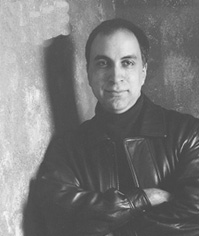
Composer Anthony Cornicello (born in Brooklyn, New York, 1964) writes music that blurs distinctions between performers and electronics, timbre and harmony, composition and improvisation, and explores the boundaries of what may be considered post-classical concert music. His music is vibrant and visceral, full of rhythmic energy and harmonic sophistication, and his forays into live electronics have led to exciting combinations of instruments and processed sound. Cornicello’s background as a jazz pianist is evident not only in the rhythmic activity of his music, but also in his constant investigation of the rich sonorities available from a variety of instruments.
He has been commissioned to write music for the Scorchio Electric String Quartet, ModernWorks! (funding from Meet the Composer/ Commissioning Music USA), the Auros Group for New Music, the Prism Saxophone Quartet, the New York New Music Ensemble, David Holzman, the Group for Contemporary Music, and the InterEnsemble of Padova, Italy. His work has also been featured on the Guggenheim Museum’s “Works and Process” series. Cornicello’s works have also been performed by the Chicago Civic Symphony, Parnassus, ALEA III, Composers Concordance, Madeleine Shapiro, Robert Black, among many other outstanding groups and solo performers. His music has been presented as part of the Darmstadt International Festival of New Music as well as the June in Buffalo Festival.
Cornicello’s Second String Quartet has been recorded by the Atlantic String Quartet; the Second Sonata for Piano by David Holzman (Centaur). More recently, his Post-Modern Waltz was recorded by Eric Moe for Albany Records. A portrait CD of Cornicello’s works is scheduled for 2006 release on Albany Records.
As a performer, he has conducted or played piano in his own works on numerous occasions. While a graduate student at Rutgers, he formed and directed the Janus Ensemble, a group dedicated to contemporary music. More recently, Cornicello has begun performing on the laptop, using a variety of interfaces and the Max/MSP program. Those performances, mostly with EEE!, have had a notable impact on his music, as EEE!’s music ranges from hip-hop to experimental noise. EEE! is based at Eastern Connecticut State University, where Cornicello is an Associate Professor and Director of the Electronic Music Lab.
Cornicello received the Ph.D. from Brandeis University, where he studied with David Rakowski, Eric Chasalow, and Martin Boykan. His teachers also include Charles Wuorinen, Gérard Grisey, and Richard Beirach.
His current fields of interest include developing unusual interfaces for live computer music performances, as well as continuing to investigate resonance and spatialization. His recent and current projects (mostly for string instruments and electronics) have been exploring the latter two, and the series of experimental works ReZenant Garden, performed by EEE! have operated on all three areas of interest. Future projects will include works for instrumental groups or soloists and electronics, as well as turntablists.
Cornicello's works are published by C.F. Peters Corporation and APNM, and he is a member of BMI.
|
|
|
|
|
|

Sunday, March 11, 2007
Spat~ woes....
Okay, I've tried to use Spat~ a few times. Usually, it works; often it slows down my system to a crawl. This time, it just pissed me off!
Now, for the un-initiated, non-Max/MSP geeks out there, Spat~ is a Max/MSP object that simulates 3-dimensional space. Sounds procesed with Spat~ are "placed" in a room - they can be localized, the sound can have directionality. (e.g., imagine the difference in sound in having a trumpet player stand 10 feet away from you; now, have him turn around, facing away; then have him suddenly re-appear 30 feet away, 90 degrees to the right. That's the kind of control you have with Spat~). And, it's made at IRCAM, where they've been doing things like this since the early 90s.
The IRCAM pieces I've seen normally use a second computer just for Spat~. At least that was the older setup; as computers get faster, there's less of a need for this.
What got me angry, though, was how unreliable the software was. Yesterday, before rehearsal, everything was okay. I turn the computer on and load up my program, and I'm getting an error message (in the Max 'listener' window), telling me that one of the sub-routines in Spat~ was getting a 'divide by 0' error (or something similar). This was odd, considering I hadn't touched that module!!! It then caused my computer to crash - repeatedly, until I removed Spat~ from the patch for my piece.
Usually, computers are reliable; things are usually just as you left them. This was like leaving a room, and coming back to find the chairs missing.
So, for now, I'm using another program to simulate sound placement. Not as fancy-pants as Spat~, but it works.
Anyone else have any Spat~ problems? I'm using a PowerBook G4, 1.5 GHz processor, with 2 GB of ram. I'm curious if others have had similar problems. Now, mind you, I'm running a LOT of processing on this patch. The patch uses around 40% of the CPU power.
Nonetheless, I'm still looking forward to Tuesday.
posted by Anthony Cornicello
|
| |



